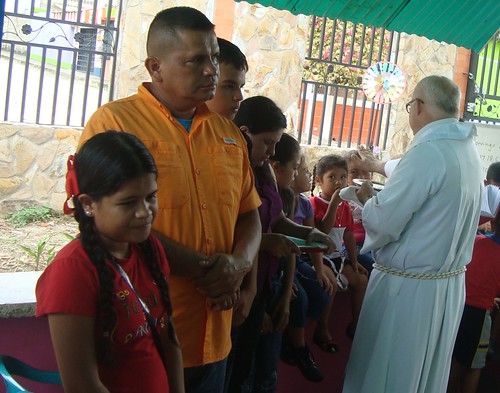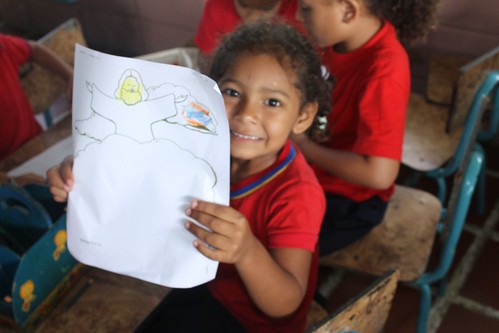
How very quickly the "festival half" of 2013-2014 church year has passed for us, but especially the seasons of Lent and Easter. We observed Ash Wednesday amid political unrest that claimed a number of lives, left many more people injured, and led to the suspension of traditional pre-Lenten festivities in many Venezuelan cities. Since then, annual inflation of Venezuela's currency has topped 60 percent, resulting in spiralling food prices. In the first quarter of 2014, inflation climbed by 10.1%, the highest jump in Venezuela's history for the first three months of the year since 1996. According to the newspaper, El Universal, spiraling inflation comes hand in hand with signals that the economy is heading towards recession, amidst a slowdown in manufacture, construction, trade, and stagnant oil production. Recession plus high inflation could mean a new increase in poverty, which in 2013 soared to 27.3%.
Shortages of basic products, like milk, paper and medical supplies, have continued and extended into new categories. Venezuelans, who place a great deal of importance on personal grooming, have had to get used to scarcity of shampoo, cosmetics and deodorant. Coffin production has dropped between 20% and 30% this year for lack of materials, forcing funeral and burial delays. Power outages have continued as well. El Universal reported that on June 18, localities in the Venezuelan states of Anzoátegui, Sucre, Nueva Esparta, Aragua, Carabobo, Miranda, Vargas, Mérida, Zulia and Falcón all suffered power outages at the same time. Of course, these blackouts do not make national or international headlines if they are only on a local scale.
Here in La Caramuca, we experience power outages at least once or twice a week, usually lasting two to three hours. Last weekend we were without power for 12 hours. These lengthy blackouts result from the fact that workers for the state-owned electric utility receive less than 40% of the materials needed to fix generation and distribution facility breakdowns. These problems have led to continued protests, a shake-up in the federal goverment and, of course, increased uncertainty about the future for many Venezuelans.
We have adapted to this constantly changing situation as best we can, primarily by growing more and more of our own fruits and vegetables on our property. In keeping with the objectives of our mission, we have shared our produce with the neediest members of the surrounding community. We also have offered cooking classes to teach the preparation of nutritionally balanced meals in the most economical way possible.
And we have continued to celebrate with joy the great festival days of Easter, the Ascension, Pentecost and Trinity Sunday. One Sunday we used white wine for the sacrament of the Lord's Supper because there was no red wine available. I explained to our congregation that we would not change any aspect of the order of Holy Communion to suit our own whims, but the general scarcity of everything now included red wine and that Scripture only requires that the visible element must be wine and not grape juice. The color and other secondary attributes are not of the utmost importance. By God's grace, someone took my little speech to heart and through personal contacts located a place where we were able to buy a case of red wine.

Members of Corpus Christi Lutheran Church in Barinas joined us for our Easter Sunday service. The Corpus Christi congregation was planted years before our mission in La Caramuca, but has not had its own pastor for some time. We pray for them as Miguelángel Pérez, the presiding pastor of the western zone of the Lutheran Church of Venezuela, helps them in extending a call to a new pastor (in fact, Miguelángel and myself are the only ordained pastors of Lutheran Church of Venezuela in the western third of the country at this time).
In my Ascension Sunday sermon, I emphasized that the Ascension of Christ is linked with the mission of the church, which is this: To prepare people for the second coming of Christ, when He will come in glory to judge all nations. How do we do this? By proclaiming the gospel, to call people to repentance and salvation before the second coming of Christ. We could not do this without the Ascension of Christ, because with all authority in heaven and earth, He sent the church the Holy Spirit to help proclaim the gospel everywhere. Like the angels, this same Jesus which is taken up from you into heaven said, will come in like manner as you saw Him go into heaven. Clouds hid Christ, and Christ in the clouds revealed. Among his Ascension in the clouds and his return in the clouds is the time to proclaim the gospel, to repent for his glory in Christ as Lord and Savior. But the apostles had a question for Christ before His Ascension. "Lord, will you restore the kingdom to Israel at this time?"
The apostles, like many people at that time thought of the Messiah, the promised Savior of Israel as a political hero, who would defeat the Romans and restore the kingdom of Israel to the glory of the days of David and Solomon. But Christ was not this type of Salvador. He was much more. He won spiritual freedom for the whole world, not just independence for one single country. So Jesus' answer was as follows: "It is not for you to know the times or seasons which the Father hath put in His own power; But you will receive power when the Holy Spirit has come upon you; and you will be my witnesses in Jerusalem and in all Judea and Samaria, and to the ends of the earth. "



No comments:
Post a Comment